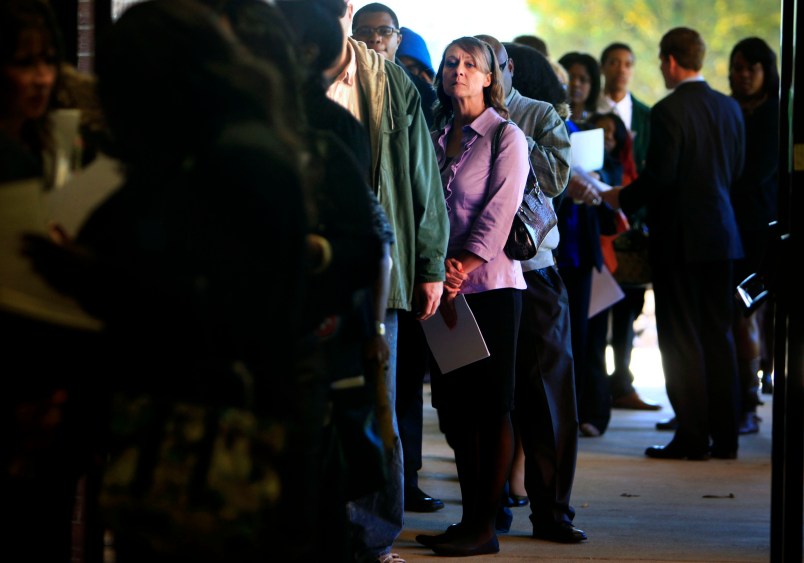When Congress returns from the holiday recess this week, Democrats will kick off the new session with a last-ditch push to renew emergency unemployment benefits that expired on Dec. 28.
But despite their cautious optimism, they face a tough slog as most Republicans have little desire to extend the benefits, which have already lapsed for some 1.3 million Americans who have been out of work for at least 26 weeks, and will expire for more in the coming months.
Senate Democrats have set up a test vote on Monday to extend unemployment compensation for three months. The bill is sponsored by Sens. Jack Reed (D-RI) and Dean Heller (R-NV). Sixty senators are required to break an expected filibuster and it’s not clear there are that many votes. Democrats are united in support but Heller is currently the only surefire GOP vote — his state has the highest unemployment rate in the country, at 9 percent.
“If Republicans block this renewal, I think it’ll have an effect and hurt their chances in the 2014 elections,” Sen. Chuck Schumer (D-NY) told reporters on a conference call Sunday. “The tectonic plates have shifted in the last five years… If Republicans block this renewal it’s going to place them far out of the mainstream in terms of fighting for the middle class.”
A majority of Americans support renewing unemployment benefits, according to recent polls by Democratic outfits Hart Research Associates and Public Policy Polling. A one-year extension would cost about $25 billion. The nonpartisan Congressional Budget Office has found unemployment compensation to be a very effective form of stimulus in a weak economy.
Even if Democrats secure the 60 votes to ensure Senate passage, it’s far from clear the GOP-led House will play ball. Republicans have broadly coalesced around the view that the benefits, which first passed in 2008 when the economy was in free-fall, came about as an emergency measure and shouldn’t continue now that the economy has improved.
“I think what’s really cruel is to have an economy that doesn’t have jobs in it,” Sen. Rand Paul (R-KY) said Sunday on ABC’s “This Week.” “So we have to talk about what policy creates jobs. With regard to unemployment insurance, I’ve always said that I’m not opposed to unemployment insurance, I am opposed to having it without paying for it.”
Speaker John Boehner (R-OH) has left some wiggle room to support a renewal of the benefits, saying he’ll consider a proposal that is paid for. That’s his public position, although he and other Republican leaders haven’t shown any interest in getting such a bill across the finish line.
The Reed-Heller legislation does not specify a pay-for but Democrats have floated several ideas. Schumer on Sunday proposed offsetting the cost by unwinding tax loopholes for corporations that move jobs overseas. House Democrats have offered to pay for it by cutting agriculture subsidies.
Failing to extend the compensation would result in “the loss of a critical lifeline” for those looking for work, said Sen. Jeanne Shaheen (D-NH), who is up for re-election this year.
Reed said Democrats are courting all Republicans but wouldn’t assure that 60 votes are there. “We’ve reached out to all of our colleagues,” he told reporters on Sunday. “Obviously there’s a focus on states with high unemployment.”
Schumer dismissed arguments made by some conservatives that unemployment benefits discourage people from trying to find work. “That is insulting to the American worker,” he said. “The American worker wants to work.”
So, where does all this leave the prospects for Senate passage?
“I think the vote is close,” Schumer said. “But certainly if we don’t get to 60 we will come back at this issue. … So I do think we’ll get it done.”






